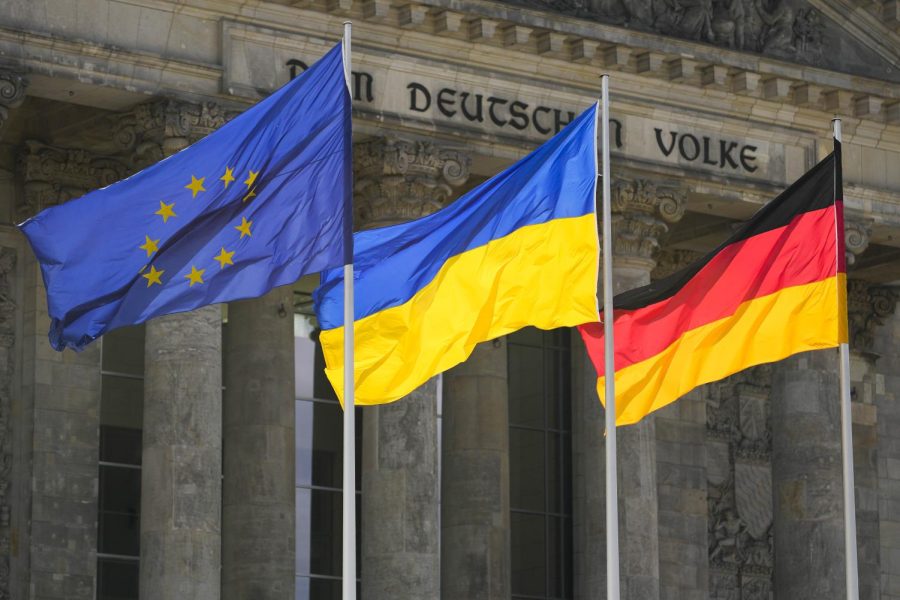Food security drops amid Ukraine war
MARKUS SCHREIBER/Associated Press
The Ukrainian national flag waves between the Europa fag, left, and the German national flag, right, in front of the Reichstag building during a debate at the German parliament Bundestag in Berlin, Germany, June 1. The inscription reads: ‘The German People’.
June 1, 2022
UNITED NATIONS — The U.S. ambassador to the U.N. on Tuesday said the Biden administration supports the shipment of Russian grain and fertilizer to address increasing global food insecurity sparked by the war in Ukraine.
Linda Thomas-Greenfield told reporters at U.N. headquarters that there are no U.S. sanctions on Russian shipments of grain and fertilizer, but she said companies are “a little nervous” and have been holding back.
Thomas-Greenfield said the United States is prepared to give “comfort letters” to grain and fertilizer exporters and insurance companies in an attempt to get badly needed agricultural products out of Russia.
She said the Biden administration is “very supportive” of efforts by U.N. Secretary-General Antonio Guterres to allow grain exports out of Ukraine by train and the Black Sea, as well as his work to ensure Russian food and fertilizer have unrestricted access to global markets.
A U.N. spokesman said Tuesday that Rebeca Grynspan, the secretary-general of the U.N. Conference on Trade and Development, visited Moscow on Monday and held “constructive discussions” with First Deputy Prime Minister Andrei Belousov on facilitating Russian grain and fertilizer exports.
Global hunger levels are at a new high, Guterres said. He said Ukraine and Russia together produce almost a third of the world’s wheat and barley and half of its sunflower oil, while Russia and its ally Belarus are the world’s number two and three producers of potash, a key ingredient of fertilizer.
___
BRUSSELS — The European Union urged its international partners to avoid placing trade barriers on farm products as Russia’s war on Ukraine risks further fueling a possible global food crisis.
“We call on all partners not to restrict trade on agricultural products,” European Commission President Ursula von der Leyen said after an EU summit Tuesday in Brusse.
Ukraine has said Russia is blocking the export of 22 million tons of its grain, some of it destined for Africa. African countries imported 44% of their wheat from Russia and Ukraine between 2018 and 2020, according to the U.N.
Von der Leyen said the EU is trying to help get food out by road and rail, but land transport assistance might only provide for a fifth of Ukraine’s usual monthly exports.
“It is of course more tedious and expensive, but it is necessary to get this wheat out,” she said.
Russian President Vladimir Putin has said the EU’s sanctions are making things worse. Putin said he’s willing to help ease concerns if the restrictive measures are lifted.
Also in Brussels, the chair of the African Union, Senegal’s President Macky Sall, has told European Union leaders that Russia’s blockade of Ukraine ports is paving the way for a “catastrophic scenario” of widespread shortages and price hikes across his continent.
In another addressed to the summit, Sall said that a halt to grain and fertilizer exports via the Black Sea is very worrying for a continent hosting 282 million undernourished people. He said that the price of fertilizer across Africa has already tripled compared to 2021.
Charles Michel, the EU Council president, said that “the EU is sparing no efforts to free Ukraine’s exports over land and exploring alternative sea routes.”
African countries imported 44% of their wheat from Russia and Ukraine between 2018 and 2020, according to U.N. figures. The African Development Bank is already reporting a 45% increase in wheat prices on the continent.
___
KYIV — Russia’s top diplomat has again blamed the hampering of exports of Ukrainian grain and a global food crisis on Kyiv and the West.
Foreign Minister Sergey Lavrov said earlier in the week that Russia guarantees “free export of Ukrainian grain by ships that are now locked in Ukrainian ports,” but Ukraine first needs to “de-mine the coastal waters that are in the territorial sea of Ukraine.”
Lavrov told a news conference after meeting with his Bahraini counterpart Abdullatif bin Rashid Al Zayani that if that is done, “in the open sea … Russia’s naval forces will ensure the unimpeded passage of these ships to the Mediterranean Sea and further to their destinations.”
Lavrov added that the West must consider whether it wants to prioritize “PR” over taking “concrete steps” to solve the issue of food security.
___
ISTANBUL – Turkey’s foreign minister Mevlut Cavusoglu reported Russia’s Lavrov will visit Turkey on June 8 for talks that will address among other things opening a Black Sea corridor for Ukrainian grain exports.
Cavusoglu also said in a video interview with the state-run Anadolu news agency that the French and German ambassadors had been summoned to the Foreign Ministry over demonstrations in their countries by groups considered by Ankara to be terrorists.
Turkey has said activities of the Kurdistan Workers’ Party, or PKK, in Sweden and Finland are one of its objections to those countries joining NATO. The PKK is designated a terrorist organization by the European Union and U.S.



